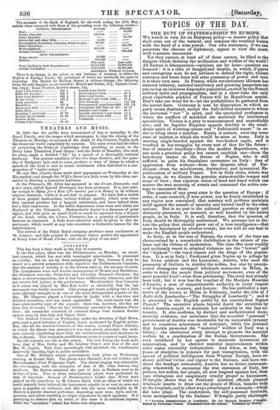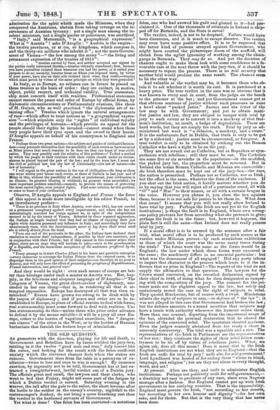TOPICS OF THE DAY.
THE DUTY OF STATESMANSHIP TO EUROPE.
WE watch in vain for an European policy—a master policy that shall arise out of the turmoil, and compose the troubled waters
with the hand of a wise power. Our own statesmen, if we can penetrate the obscure of diplomacy, appear to view the storm with insensate unconcern.
Yet they cannot, at least all of them cannot, be blind to the dangers which threaten the civilization and welfare of the world?
All Europe is disorganized—opinions are let loose—passions are licensed : it is a time of danger/ and trouble, in which, if grave and courageous men do not advance to defend the right, violent
extremes and brute force will seize possession of power and turn
it to their own uses. In France, while revolutionary idleness has arrested industry, national insolvency and growing pauperism are
proaucing an immense disposable population,excited by the French military spirit and propagandism, and in a short time the only great exportable produce of France will be Republican armies. Don't take our word for it—let the probabilities be gathered from the patent facts. Germany is torn by disputation in which no party seems dominant, except the duel-drilled students to whom the universal " row " is sport, and the spectacled professors to whom the conflicts of mankind are materials for intellectual speculation. Vienna is a prey to unaccustomed and unprofitable riot ; and its fugitive Emperor appeals forcibly to the retail- dealer spirit of watering-places and " fashionable resort " in or- der to bring about a reaction. Russia is patient, awaiting some state of matters in which she would be more at home. Italy is warring single-handed against the two-beaked eagle, and is troubled in her struggles by every sort of fear for the future : fear of internal treachery—from the madder Republicans, who
can undo a practical policy but cannot establish one—from the hereditary traitor on the throne of Naples, who is still
suffered to palm his fraudulent assurances on Italy : fear of aggression from without—from the despotic allies of Fer- dinand—from the mischievous, destructive, and tyrannical Re-
publicanism of military France. Yet in Italy alone, where war is raging, do we discern the genuine statesmanlike temper and scope of view ; that vigorous union of head and hand which can master the true meaning of events and command the active cou- rage to encounter them.
The question of any great state is the question of Europe : if order, if sane councils, if wise power, can be firmly established in any region now convulsed, that mastery will perforce maintain itself against the assault of anarchy and extend itself to the other nations. But in no part is the national question so simply and distinctly presented, so matured, so well handled by the native people as in Italy. It is well, therefore, that the question of Italy should be thoroughly understood. We presume not to dic-
tate the policy that should grow out of a true intelligence—that must be determined by ulterior events; but we will do our best to make the English people understand.
In Italy, as in the rest of Europe, the events of the time are characterized by a remarkable distribution in the crimes of vio- lence and the virtues of moderation. The class that most readily and uniformly resort to criminal violences are the "lowest" and the "highest "—the royal classes and the dregs of the popula- tion. It is so in Italy : Ferdinand gives Naples up to pillage by
his Swiss soldiers and the Lazzaroni; Austria, who used the peasantry of Gallicia to murder the nobles, has also by precon- certed stratagems arranged wholesale massacres in Milan, in
order to deter the people from political movement, even of the most peaceful kind—even from petitioning. The story had already been told ; but it now has the voucher of the Marquis Massimo
d'Azeglio, a man of unquestionable authority in every respect —of knowledge, acumen, and honour. He has published a nar- rative of the events at Milan in February, under the title of I Lutti della Lombardia—"The Struggles of Lombardy "; and it is presented to the English public by his countryman Signor
Prandi.* The narrative places beyond doubt the atrocities by which Austria sought to maintain her authority in the last ex- tremity. It also confirms, by distinct and authenticated docu- mentary evidence, our assurance that the so-called " paternal" government of Austria was intolerable for its inexorable tyranny and its vexatious minuteness of restraint; while the pretence
that Austria promoted the " material" welfare of Italy was a
fallacy : she obstructed every attempt to promote the material welfare by a combination of the Italian Governments. She even interfered by her agents to maintain tyrannical ad- ministration, and to obstruct material improvements within other states ostensibly independent. And when, at last, long years of discipline in penance for past transgression, with the spread of political intelligence from Western Europe, have re- stored political virtue and vigour to the Italians, and have ren- dered the bondage unbearable, Austria has no better statesman- ship wherewith to encounter the true statesmen of Italy, her princes, her nobles, her people, all now leagued against her, than base stratagems and sanguinary cruelty proper to buccaneers. D'Azeglio shows that in February Austrian officials planned wholesale insults to draw out the people of Milan, bespoke beds at the hospitals, and in other ways prearranged a massacre—which did take place. The moderation, the self-possessed fortitude, were monopolized by the Italians: D'Azeglio justly challenges
• "Austrian Assassinations in Lombardy. By the Marquis Massimo dusegllo. Edited by Fortunate Prawn. Translated from the Italian." Published by Newby. admiration for the spirit which made the Milanese, when they conquered the Austrians, abstain from taking revenge on the in- struments of Austrian tyranny: not a single man among the in- solent ministers, not a single gaoler or policemen, was sacrificed.
" Italy," said Metternich, ' is a geographical expression." What is " Austria " ? asks D'Azeglio " Austria is the empire— the twelve provinces, or at :tee, or kingdoms, which compose it, and the thirty-six millions who inhabit it " ; not the mere Govern- ment of Vienna—" the few among the many "—" the living and permanent expression of the treaties of 1815":
"treaties carried by force, and neither accepted nor signed by the parties really interested therein,—treaties virtually abandoned; first, because you have yourselves violated them whenever you had the power, or it suited your purpose to do so; secondly, because those on whom you imposed them, by virtue of your power, have also on their side violated them when they could;--treaties which must perish by virtue of the same principle on which they were grounded."
In Italy, as in Europe, no reliance can in future be placed on these treaties as the basis of order : they are extinct, in motive, object, public respect, and technical validity. True statesman- ship must concern itself with realities. Professional statesmen cannot restore the peace and order of Europe by official forms, by diplomatic circumlocutions or Parliamentary evasions, like those of M. Guizot, who so well practised " the diplomatic art of re- taining office. ' Treaties which ignore the natural arrangements of race-s-which affect to treat nations as " a geographical expres- sion "—which stipulate only the " rights " of individual royalty and the privileges of bureaux—which provide no appeal for the people should their rights be invaded—cannot stand when those very people have their eyes open and the sword in their hands. D'Azeglio appeals on behalf of his countrymen to England and France.
" Perhaps these two great nations—the arbiters and guides of civilized Christen- dom—may persuade themselves that the possibility of such events as have occurred at Milan proves that much remains to be done ere they can boast of true civili- zation. They may possibly seek the solution of this problem—' To find a method by which the people in their relations with their rulers should under no circum- stances be placed beyond the pale of the law; and by the term law, I mean not the civil or political law, but the law of Christianity—the law of nature--the law of humanity.' " I will repeat to the great nations in the van of civilization—So long as there can occur within your bosom such events as those of Gallicia in last year and of Milan in this, without the possibility of check or punishment, your civilization is an illusion: its greatest blessing is withheld; its greatest want unsatisfied; its most important problem unsolved,—namely, to provide the means of protecting the most sacred rights, even natural rights. Find some solution for this problem, or cease to boast of your civilization."
Observe, D'Azeglio appeals to England and France : the force of this appeal is made more intelligible by his editor Prandi, in an introductory preface— "There is no province in Italy where Austria, ever since 1815, has not carried on a permanent conspiracy against every improvement, and where she has not unhesitatingly marched her troops against us, in spite of the independence secured to us by the treaty of Vienna. Schooled by these repeated aggressions, the Italians at length learned that they had no chance of enjoying their just rights while Austria possessed any influence in Italy; and accordingly they have unanimously risen, with the determination never to lay down their arms until she is utterly driven from the land. "From one end of the peninsula to the other, the Italians have declared their resolntionto recover their independence, if possible by their own exertions, and in conjunction with their Princes; but if they cannot in this manner attain their
• ect, there are no steps they will hesitate to take,—even to the proclamation of a Republic, and the hazardous acceptance of the assistance proffered by the
ch.
"Every attempt to thwart Charles Albert in his brave and patriotic enterprise —every endeavour to estrange the Italian Princes from the national cause, or to disparage them in the good opinion of their subjects—can therefore do no good to Austria, and will only have the effect of,promoting the progress of Republicanism, French intervention, and general war."
And they would be right : even such means of escape are bet- ter than bondage under such a master as Austria was. But, hap- pily, in the felicitous and eloquent language of D'Azeglio--"The Congress of Vienna, the great sheet-anchor of diplomacy, suc- ceeded in but one thing—that is, in rendering all that it at- tempted impossible. Europe has destroyed all that was then es- tablished.' Events have grown too strong to be dealt with by the jargon of diplomacy ; and if peace and order are to be re- established in Europe, in place of official routine to deal with forms, real statesmanship must come forward to deal with realities. Un- less statesmanship do this—unless those who prize order advance to defend it by the means suitable—it will be a prey all over Eu- rope, either to the hordes of vagabond anarchists, the " danger- ous classes " of the cities in the West, or to the hordes of Russian barbarians that furnish the forlorn hope of Absolutism.



























 Previous page
Previous page